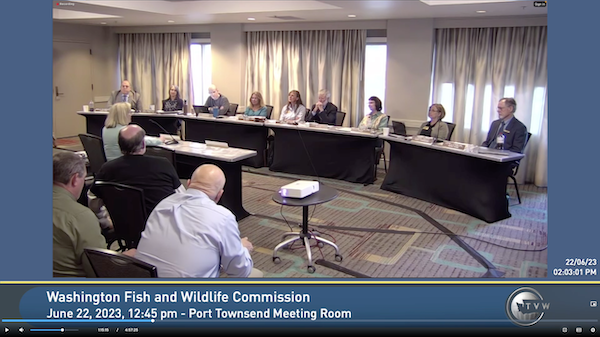
Everyone Has Their Say On WDFW Commission Conservation Policy
Sportsmen, state residents, local and national conservation organizations, the Governor’s Office and preservationists all had their say on the Washington Fish and Wildlife Commission’s draft Conservation Policy at meetings in Seattle that continue this morning.

The controversial new policy meant to guide future WDFW decision-making excited strong feelings in some, with hunter Carl Barner of Auburn on Thursday calling it “not asked for … not needed” and “a lie because you are not being honest with your motives,” which he believed to be to end recreational hunting and fishing.
Earlier, two of the policy’s authors – Chair Barbara Baker and Ruth Musgrave, now of the Governor’s Office – stated it was not about cancelling either, and at the end of Thursday’s meeting Commissioner John Lehmkuhl went off on Barner about it, leaving some taken aback by his response that begins at the 4:52:38-minute mark.
As the Rocky Mountain Elk Foundation termed the proposed policy a “radical departure” with an “unrecognizable” definition for the word conservation – the lack of a specific meaning for that word in WDFW’s 25-year plan is one of Baker’s reasons for having developed the draft policy – environmental groups and private citizens expressed support for it, citing climate change and heavy development.
Other comments were more substantive, with hunter-angler-gatherer-gardener-wildlife photographer Jon Dykes of Kenmore this morning asking for the document’s language to more clearly support hunting.
“I wish we’d encourage it in the Conservation Policy, celebrate it,” Dykes said.
Jen Syrowitz of Conservation Northwest stated while her organization supported the intent of the policy to work more on habitat for non-game and non-fish species, with people’s role having been “purposefully” left out of the draft to not weigh some above others, she thought it would be helpful to acknowledge those contributions.
“We could not have had the conservation wins of the 20th Century without sportsmen and -women. Their financial and on-the-ground contributions are, as yet, unparalleled. Moreover, we will not have conservation wins in the 21st Century without the continued good work of sportsmen and -women and investments from the larger conservation community and emerging voices interested in wildlife management. Only a broad conservation coalition will be able to meet the challenges of the 21st Century,” Syrowitz said Thursday afternoon.
It was reminiscent of how WDFW brought together broad swaths of stakeholders for its generally successful Budget and Policy Advisory and Wolf Advisory Groups.
But on the flip side, Claire Loeb Davis of Washington Wildlife First took her moment at the mic Friday morning to minimize the contributions of hunters, tearing into the billions that have flowed to state fish and wildlife agencies via decades upon decades of federal Pittman-Robertson Act excise taxes on guns, ammo and archery equipment.
Kim Thorburn, whose introduction to the meeting by commission staff as “Commissioner Kim Thorburn” drew a not-very-under-the-breath “ex-commissioner” from Commissioner Lorna Smith, while Commissioners Melanie Rowland and Lehmkuhl both walked off, spoke to leveraging a wide variety of stakeholders and agencies around imperiled sage grouse recovery in Eastern Washington that benefitted from Ducks Unlimited habitat restoration work on WDFW and BLM lands.
Wetlands, where waterfowl- and hunter-oriented DU has focused its works since the 1930s, is the sole habitat not seeing declines in native bird populations. A 2022 report states, “Birds across the U.S. show downward trends in every habitat except in wetlands, where comebacks of waterfowl show the power of funding and policy investments.”
More details also emerged yesterday about the murky origins of the draft policy, which first emerged publicly – and to some surprise – at a September 2021 commission meeting.
“Congratulations on that conservation policy. In my other life I actually helped work on it,” Ruth Musgrave, who is now Jay Inslee’s senior natural resources policy advisor, told the commission.
At the time she would have been the president of her Wildlife Policy Consulting of Olympia and a conservation senior advisor for the National Caucus of Environmental Legislators.
“And I know this was Jeff Davis’s dream, and you all have done an incredible job. And I just want to clarify that, when we were working on it, and this is not as a representative of the governor, we were trying to be cognizant of hunters and fishermen and just enlarge the tent, not restrict the tent. Certainly not anti-hunting, certainly not anti-fishing – members of my family would not appreciate that if we were so,” Musgrave said.
Davis is WDFW’s former Conservation Director and currently the director of Colorado Wildlife And Parks.
As an aside to an audience member, Musgrave said it was “good advice to take hunter ed, and I’ll take it myself.”
Along with feedback from state hunters, anglers, conservationists and others, Northwest Indian Fisheries Commission Chair Ed Johnstone has weighed in on the policy, terming it a “vaguely worded” document that threatens treaty-guaranteed harvest and comanagement of fish and wildlife.
That might be the ultimate kill switch in all of this, but comment continues through the end of June. Go here to add your thoughts, email draftconservationpolicy@PublicInput.com or call (855) 925-2801 and enter code 4262 to leave a voicemail. The commission is currently scheduled to make a decision on the policy at its October 26-28 meetings in Olympia.
I’ve got other blogs to write and layouts to proof, so that is going to have to be that for now.
